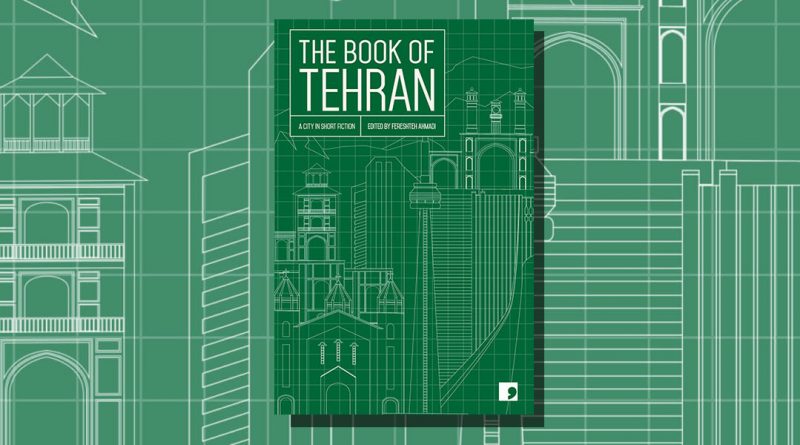The Book of Tehran edited by Fereshteh Ahmadi
– Reviewed by Rhys Knapman –
The Book of Tehran is a Comma Press anthology of short stories written by Iranian authors and translated into English. All tell tales set in and around the capital city, and are gathered with the intention of showing that Tehran is an ‘impossible tale to tell’ and is far more complex than the western media portrays. Each story is told in its own individual voice, including variation between third, first and second person narrative.
Opening the collection is ‘Wake It Up‘, written by Payam Nasser and translated by Sara Khalili. Nasser writes from a first person point of view as an unnamed protagonist taking us through the aftermath of the departure of Kimia, his partner. Fancying himself a romantic poet and/or story writer, the protagonist is disappointed in the reality of the break-up as, initially, he ‘bore no resemblance to defeated men’ seen in the media. Eventually, however, he becomes obsessed with the memory of his lost love — finding strands of her hair all around their home as well as little notes they shared in university — and so moves to a smaller unit. In this first part of the story the protagonist shares with us his superstitions: he believes that “burning strands of hair left behind by a woman would cause her to suffer loneliness and agitation”, but states that it “didn’t accomplish anything”. It is also in this first section that the character’s enthusiasm for silent, black and white films is shown, leading to the beautiful simile:
“While packing, memories of bygone days had passed before my eyes like scenes in a silent film. I packed the good days with greater care.”
In his new home, the protagonist meets a four year old child. The two begin to play what is described as a ‘game’, in which the boy would take something from their apartment to offer the protagonist who in turn would refuse it. All the while, details of the protagonist’s relationship with Kimia are revealed.
Overall, the short story is a powerful exploration of the protagonist’s mental and emotional development over a period of months, showing that while holding on to the past can sometimes be useful it can also be harmful.
‘In The Light Being Cast From The Kitchen‘ is one of the shorter stories in the anthology, weighing in at fewer than 10 pages long, and is one that raises far more questions than are answered. Written by Hamed Habibi and translated by Shahab Vaezzadeh, the story is written in the second person, substituting all pronouns associated with the viewpoint character for ‘you’, possibly used to add to the sense of unreality and confusion, both themes of the story.
The point of view character — and by extension the reader — is woken very early in the morning, around half three, for some unknown reason. ‘You ‘leave the bedroom door ajar and see a man in a nice suit on the sofa. This premise, as well as the various stages of panic that ‘you’ go through, seem perfectly suited to a home invasion horror story in the vein of the original Purge film — the character certainly makes mistakes more common to horror novels and cinema than any other genre, such as leaving a phone out of easy reach (in this case because of an irrational fear of radiation.) Similarly suitable for a horror story is how ‘your’ wife wakes up, sees the suited figure in the living room and waves. This small action kicks off a series of angsty, almost nihilistic thoughts in the point of view character. ‘You’ begin to wonder if ‘you’ aren’t in fact the one out of place, and if the man in the suit is the actual home owner, then ‘you’ might actually be the invader. (After all, “bear in mind that a vest and pyjama bottoms do not automatically make you the homeowner”).
As a metaphor for an identity crisis as a result of age and circumstance, the story works well. Between episodes of panic and describing everyone but themselves, ‘you’ share ‘your’ thoughts as an internal monologue. These psychological elements develop the character just as much as their actions, or lack thereof.
“You roll over onto your side and stare into the distance through half-closed eyes. A mild shudder runs through your body and across your blanket like a wave breaking over rocks at the edge of a lake.”
Overall, I believe the piece perhaps suffers as a result of being written in second person. While the disorientation created by being thrown into the action, rather than being an observer, may be intentional on the part of the author, it could also create a barrier for readers who do not fall into the exact same demographic as the protagonist, making it difficult to become as invested.
One of the stronger works in the anthology is the piece ‘Domestic Monsters‘. Written by Fereshteh Ahmandi, translated by Caroline Croskery, it is a first person piece in the style of a letter. Though the recipient is never named, only ever referred to as ‘you’, over the course of the story enough details are provided to show a close familial connection.
“I used to think the heat of the sun would evaporate all this over time, but now as I stand knee-deep in it, struggling to find the bottom, I realise that the passing of time has only made the stench worse. But forget all of these meaningless metaphors!”
The letter begins with the ‘meaningless metaphor’ of a swamp, comparing it to the ‘stench’ the protagonist is confronting by writing. We are then taken through the evolution of the relationship ‘from the beginning’ showing how the recipient of the letter stopped being someone who ‘wasn’t like other people. (She) was someone to be respected’. The story takes place over years, yet feels neither light nor overly heavy on details.
While ‘Wake Them Up’ and ‘In The Light Being Cast From The Kitchen’ were fairly universal in setting — with few details setting them apart from similar stories written in say, London or Paris — ‘Domestic Monsters’ feels like a story that requires the Iranian backdrop in order to maintain its weight.
While Tehran itself is given only a sentence or two, the city is described as having “woke (the protagonist) up from a long sleep” and plays a vital role in helping her get out from the abuse she was shown.
Throughout the collection, certain specific details — such as the importance of significant figures in Iranian and Islamic history referenced in the stories — are given footnotes explaining what and who they are, ensuring that the reader is not lacking any context important for enjoying the tales.






